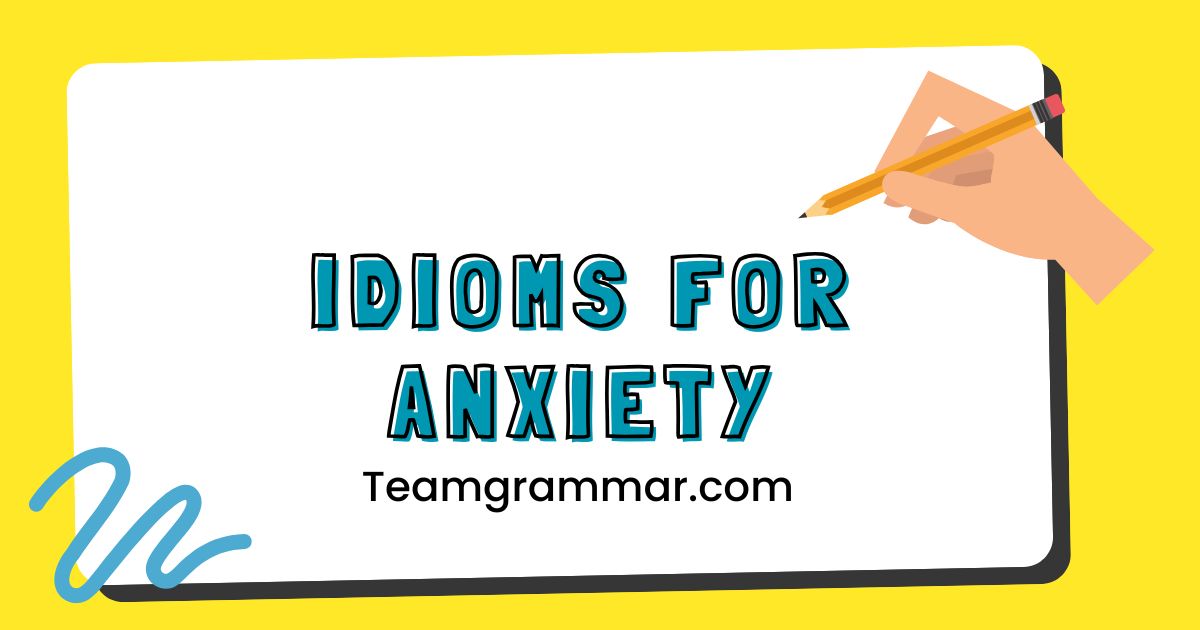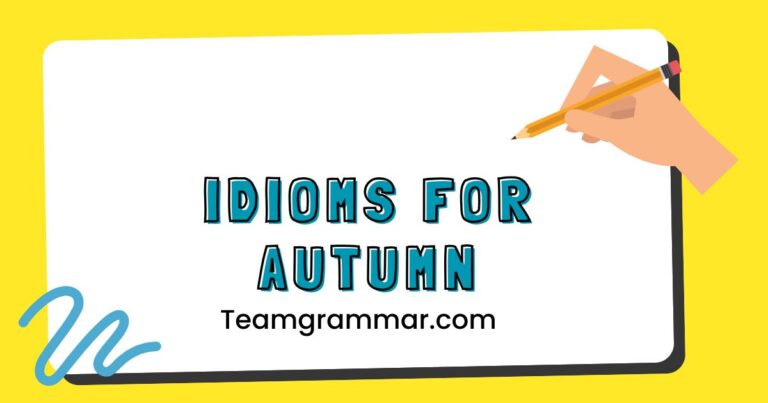29 Idioms for Anxiety: Mastering Figurative Language
Understanding and using idioms related to anxiety can significantly enhance your English communication skills. These expressions, often colorful and vivid, provide a nuanced way to describe feelings of worry, stress, and unease.
This article delves into a wide array of idioms associated with anxiety, offering definitions, examples, and practical exercises to help you master their usage. Whether you’re an English language learner or a native speaker looking to enrich your vocabulary, this guide provides valuable insights into the figurative language of anxiety.
By exploring these idioms, you’ll gain a deeper understanding of how anxiety is expressed in English and improve your ability to communicate effectively in various contexts. This comprehensive guide is designed for students, professionals, and anyone interested in expanding their knowledge of English idioms and their application in everyday conversations and writing.
Table of Contents
- Definition of Idioms for Anxiety
- Structural Breakdown of Anxiety Idioms
- Types and Categories of Anxiety Idioms
- Examples of Idioms for Anxiety
- Usage Rules for Anxiety Idioms
- Common Mistakes with Anxiety Idioms
- Practice Exercises
- Advanced Topics: Subtleties and Nuances
- Frequently Asked Questions
- Conclusion
Definition of Idioms for Anxiety
An idiom is a phrase or expression whose meaning cannot be understood from the literal meanings of its individual words. Instead, the phrase has a figurative meaning that is known through common use.
Idioms related to anxiety are expressions that describe feelings of worry, stress, fear, nervousness, or unease in a non-literal, imaginative way. These idioms can provide a more vivid and relatable way to communicate about complex emotions.
These idioms function as a form of figurative language, adding color and depth to communication. They are often used in everyday conversation, literature, and media to convey emotional states more effectively than literal descriptions.
Recognizing and understanding these idioms is crucial for both comprehending and expressing nuanced feelings of anxiety.
The contexts in which these idioms are used vary widely. They can appear in casual conversations, formal speeches, written articles, and fictional narratives.
The appropriateness of using a particular idiom depends on the audience and the overall tone of the communication. While some idioms are suitable for informal settings, others may be more appropriate for formal or literary contexts.
Structural Breakdown of Anxiety Idioms
Anxiety idioms, like all idioms, do not follow standard grammatical rules in terms of meaning. Their structure is based on conventional usage rather than literal interpretation.
The structural elements within these idioms often include verbs, nouns, and prepositions, combined in a way that creates a unique figurative meaning.
The patterns in anxiety idioms can be categorized by the type of emotion they convey. For example, idioms expressing intense fear might use strong verbs and vivid imagery, while those describing mild worry might use more subtle language.
Understanding these patterns can help learners grasp the overall meaning of the idiom.
For instance, the idiom “to have butterflies in your stomach” uses the noun “butterflies” and the prepositional phrase “in your stomach” to convey a feeling of nervousness or anticipation. The literal meaning of butterflies being in one’s stomach is absurd, but the figurative meaning is widely understood to represent a fluttery, uneasy feeling.
Another example is “to be on pins and needles,” which uses the nouns “pins” and “needles” to describe a state of heightened anxiety or anticipation, as if one is sitting on sharp objects.
Types and Categories of Anxiety Idioms
Anxiety idioms can be categorized based on the specific emotion or aspect of anxiety they describe. Here are some common categories:
General Anxiety
These idioms refer to a general state of worry or unease, without specifying a particular cause or intensity.
Stress and Pressure
These idioms describe feelings of being overwhelmed, burdened, or pressured by external factors.
Worry and Concern
These idioms focus on the mental aspect of anxiety, emphasizing thoughts of potential problems or negative outcomes.
Fear and Apprehension
These idioms convey a sense of dread, terror, or anticipation of something unpleasant.
Nervousness and Agitation
These idioms describe physical manifestations of anxiety, such as restlessness, fidgeting, or a racing heart.
Examples of Idioms for Anxiety
The following tables provide extensive examples of idioms related to anxiety, categorized by the specific emotion they describe. Each idiom is accompanied by a definition and example sentence to illustrate its usage.
General Anxiety
This table lists idioms that describe a general state of anxiety without specifying a particular cause.
| Idiom | Definition | Example Sentence |
|---|---|---|
| On edge | Nervous and anxious. | She’s been on edge all day waiting for the test results. |
| In a state | Very anxious or upset. | He was in a state after losing his wallet. |
| Have kittens | To be very anxious or upset. | My mom will have kittens if I come home late. |
| Be climbing the walls | To be very anxious or restless. | The kids were climbing the walls during the long car ride. |
| Be a nervous wreck | To be extremely nervous or anxious. | She was a nervous wreck before her presentation. |
| Sweating bullets | To be extremely nervous or anxious. | He was sweating bullets before the interview. |
| Chew one’s nails | To be nervous or anxious. | She tends to chew her nails when she’s stressed. |
| Be strung out | To be extremely anxious or stressed. | He’s been strung out ever since the project deadline was announced. |
| Be beside oneself | To be overcome with worry or anxiety. | She was beside herself with worry when her son didn’t come home. |
| Have one’s heart in one’s mouth | To be very frightened or anxious. | My heart was in my mouth when the car skidded on the ice. |
| Like a cat on a hot tin roof | Restless or nervous. | He was like a cat on a hot tin roof waiting for the news. |
| Walking on eggshells | Being very careful not to offend someone. | I feel like I’m walking on eggshells around my boss lately. |
| Tied up in knots | Extremely nervous or anxious. | She gets all tied up in knots before a performance. |
| In a cold sweat | Feeling extremely anxious or frightened. | He woke up in a cold sweat after the nightmare. |
| In a flap | In a state of panic or excitement. | She was in a flap trying to get everything ready for the party. |
| On tenterhooks | In a state of suspense or agitation. | We were on tenterhooks waiting for the election results. |
| With bated breath | In a state of great suspense or anticipation. | We waited with bated breath for the doctor to call. |
| Anxious to death | Extremely anxious or worried. | She was anxious to death about the upcoming surgery. |
| Hair-raising | Frightening or causing anxiety. | The roller coaster ride was hair-raising. |
| Keep someone on the edge of their seat | To cause someone to feel very excited, nervous, or anxious. | The suspenseful movie kept us on the edge of our seats. |
| Fret and fume | To worry excessively and show anger. | He tends to fret and fume over small problems. |
| Go spare | To become very angry or worried. | My dad will go spare if he finds out I scratched the car. |
Stress and Pressure
This table includes idioms that specifically refer to feelings of stress and pressure.
| Idiom | Definition | Example Sentence |
|---|---|---|
| Under pressure | Feeling stressed because of demands. | He’s been under a lot of pressure at work lately. |
| At the end of one’s rope | Having no more patience or energy. | She’s at the end of her rope dealing with her demanding boss. |
| Up to one’s ears | Very busy and overwhelmed. | I’m up to my ears in paperwork this week. |
| Burn the candle at both ends | To work very hard and late. | He’s been burning the candle at both ends to finish the project. |
| Driven up the wall | Annoyed or frustrated to the point of agitation. | The constant noise was driving me up the wall. |
| Have a lot on one’s plate | To have many responsibilities or tasks. | She has a lot on her plate with work, family, and school. |
| Bite off more than one can chew | To take on more than one can handle. | He bit off more than he could chew when he volunteered for three projects. |
| Keep one’s head above water | To manage to survive despite difficulties. | It’s hard to keep my head above water with all these bills. |
| Spread oneself too thin | To try to do too many things at once. | She’s spreading herself too thin by volunteering for everything. |
| Under the gun | Under pressure to meet a deadline. | The team is under the gun to finish the report by Friday. |
| Ticking time bomb | A situation likely to become dangerous or problematic. | His anger issues are a ticking time bomb. |
| Walking a tightrope | Being in a difficult or risky situation. | The company is walking a tightrope trying to balance profits and ethical practices. |
| Sweat blood | To work extremely hard. | He sweated blood to get the project done on time. |
| Go ballistic | To become very angry or agitated. | My dad will go ballistic if he finds out about the accident. |
| At wit’s end | Not knowing what to do to solve a problem. | She was at her wit’s end trying to figure out the computer problem. |
| Stressed to the max | Extremely stressed. | I’m stressed to the max with all these deadlines. |
| Feel the heat | To experience pressure or criticism. | The team is feeling the heat after losing the last game. |
| On a short fuse | Easily angered or stressed. | He’s been on a short fuse lately due to lack of sleep. |
| Running around like a headless chicken | Doing a lot of things in a hurried and disorganized way. | She’s been running around like a headless chicken trying to get ready for the trip. |
| Hit the panic button | To react to a situation with extreme anxiety or fear. | He hit the panic button when he realized he was late for the meeting. |
| Over a barrel | In a helpless situation. | They have us over a barrel because we need their help. |
Worry and Concern
This table focuses on idioms that express feelings of worry and concern.
| Idiom | Definition | Example Sentence |
|---|---|---|
| Lose sleep over something | To worry about something so much that you can’t sleep. | Don’t lose sleep over such a small problem. |
| Keep someone up at night | To cause someone to worry so much they cannot sleep. | The upcoming exam is keeping me up at night. |
| Have a weight on one’s shoulders | To have a burden or worry. | He’s been carrying a weight on his shoulders since he lost his job. |
| Cross that bridge when one comes to it | To deal with a problem when it arises. | Let’s not worry about the potential issues and cross that bridge when we come to it. |
| Borrow trouble | To worry about something before it happens. | You’re borrowing trouble by worrying about something that may never happen. |
| Give someone cause for concern | To give someone a reason to worry. | His strange behavior is giving me cause for concern. |
| Not sleep a wink | To not sleep at all. | I didn’t sleep a wink last night because I was so worried. |
| Be on one’s mind | To be constantly thinking about something or someone. | The project deadline has been on my mind all week. |
| Wring one’s hands | To show distress or worry. | She was wringing her hands, waiting for the news. |
| Take its toll | To have a negative effect on someone. | The stress of the job is starting to take its toll on his health. |
| Something preys on one’s mind | To cause someone to worry constantly. | The thought of the upcoming exam is preying on my mind. |
| Make someone sweat | To cause someone to be anxious or worried. | The tough questions made the candidate sweat during the interview. |
| Be in two minds | To be unable to decide between two options. | I’m in two minds about accepting the job offer. |
| Have a sinking feeling | To have a feeling that something bad is going to happen. | I had a sinking feeling when I saw the police car outside my house. |
| Worry oneself sick | To worry excessively and become ill. | She worried herself sick over her daughter’s health. |
| Overthink | Think about something too much or for too long. | He tends to overthink every decision he makes. |
| Can’t see the wood for the trees | To be unable to understand a situation clearly because you are too involved in the details. | He can’t see the wood for the trees because he’s too focused on minor issues. |
| Go round in circles | To keep thinking or talking about the same subject without making any progress. | We’re just going round in circles arguing about this issue. |
| Something is eating someone | Something is worrying someone. | What’s eating you? You seem distracted. |
| Can’t get something off one’s mind | Unable to stop thinking about something. | I can’t get the accident off my mind. |
Fear and Apprehension
The following idioms specifically describe feelings of fear and apprehension.
| Idiom | Definition | Example Sentence |
|---|---|---|
| Scared stiff | Extremely frightened. | She was scared stiff when she heard the noise outside. |
| Have one’s blood run cold | To be very frightened. | The horror movie made my blood run cold. |
| Shake in one’s boots | To be very afraid. | He was shaking in his boots before the presentation. |
| Frozen to the spot | Unable to move because of fear. | She was frozen to the spot when she saw the snake. |
| Jumping out of one’s skin | To be very startled or frightened. | I jumped out of my skin when the door slammed shut. |
| Have a frog in one’s throat | To have difficulty speaking because of nervousness. | He had a frog in his throat before he started his speech. |
| Like a deer caught in headlights | Paralyzed with fear or surprise. | She stood there like a deer caught in headlights when she was asked the question. |
| Quaking in one’s boots | Trembling with fear. | The thought of the exam had him quaking in his boots. |
| Have the jitters | To be nervous or uneasy. | I always have the jitters before an interview. |
| Heart skips a beat | To feel a sudden surge of fear or excitement. | My heart skipped a beat when I saw him. |
| Afraid of one’s own shadow | Very easily frightened. | He’s so nervous, he’s afraid of his own shadow. |
| Go weak at the knees | To feel faint or weak due to fear or excitement. | She went weak at the knees when she saw the movie star. |
| Break out in a cold sweat | To become anxious or frightened. | He broke out in a cold sweat when he realized he was lost. |
| Die of fright | To be extremely frightened. | I nearly died of fright when the dog jumped out at me. |
| Go pale | To become pale from fear or shock. | She went pale when she heard the news. |
| Make one’s hair stand on end | To frighten someone greatly. | The ghost story made my hair stand on end. |
| In fear and trembling | Extremely afraid or nervous. | He approached the boss in fear and trembling. |
| Turn tail and run | To run away because of fear. | When the bear approached, they turned tail and ran. |
| Get cold feet | To become nervous before an important event. | He got cold feet before his wedding. |
Nervousness and Agitation
This table contains idioms that describe feelings of nervousness and agitation.
| Idiom | Definition | Example Sentence |
|---|---|---|
| Butterflies in one’s stomach | To feel nervous or anxious. | I always get butterflies in my stomach before a performance. |
| On pins and needles | To be very anxious or nervous. | We were on pins and needles waiting for the results. |
| Fidgety | Restless and unable to stay still. | The children were fidgety during the long sermon. |
| Antsy | Restless and impatient. | I’m getting antsy waiting for the vacation to start. |
| Get the heebie-jeebies | To feel nervous or uneasy. | That old house gives me the heebie-jeebies. |
| Twitchy | Nervous and prone to sudden movements. | He’s been twitchy ever since he drank too much coffee. |
| Restless leg syndrome | A condition that causes an uncontrollable urge to move one’s legs. | His restless leg syndrome makes it hard for him to sit still. |
| Hot under the collar | Angry or agitated. | He got hot under the collar when he heard the news. |
| All of a dither | In a state of nervous excitement or confusion. | She was all of a dither trying to get ready for the party. |
| Have ants in one’s pants | To be unable to stay still because of nervousness or excitement. | The kids had ants in their pants waiting for the school bus. |
| Rattled | Nervous or agitated. | He was rattled by the unexpected question. |
| Flustered | Nervous and confused. | She became flustered when she couldn’t find her keys. |
| Worked up | Agitated or excited. | He got all worked up over the small mistake. |
| Jumpy | Nervous and easily startled. | He’s been jumpy ever since he watched the horror movie. |
| In a sweat | Nervous and anxious. | He was in a sweat before the big game. |
Usage Rules for Anxiety Idioms
Using idioms correctly requires understanding their specific meanings and contexts. Here are some key rules to follow:
- Context Matters: Use idioms appropriate to the situation. Formal settings may require more careful selection than casual conversations.
- Audience Awareness: Consider your audience’s familiarity with the idiom. Avoid using obscure idioms that may not be understood.
- Correct Form: Use the idiom in its correct form. Altering the words can change or negate the meaning.
- Avoid Overuse: While idioms can add color to your language, overuse can make your communication sound unnatural or cliché.
Exceptions to these rules are rare, but can occur in creative writing or when deliberately playing with language for effect. However, for standard communication, it’s best to adhere to the established usage.
Common Mistakes with Anxiety Idioms
Learners often make mistakes when using idioms, especially when translating them literally or misunderstanding their connotations. Here are some common errors and how to avoid them:
| Incorrect | Correct | Explanation |
|---|---|---|
| I have butterflies in my nose. | I have butterflies in my stomach. | The idiom is “butterflies in my stomach,” not “nose.” |
| She was on needles and pins. | She was on pins and needles. | The correct order is “pins and needles.” |
| He’s under the water. | He’s under pressure. | “Under the water” is a literal statement, not an idiom for stress. |
| I am losing the sleep over it. | I am losing sleep over it. | The correct phrase is “losing sleep.” |
| He is driving me up the wall with crazy. | He is driving me up the wall. | The correct idiom is “driving me up the wall.” |
Practice Exercises
Test your understanding of anxiety idioms with these exercises. Fill in the blanks with the appropriate idiom from the list provided.
- She was __________ before her job interview. (List: shaking in her boots, on pins and needles, under pressure)
- He’s been __________ since the project deadline was announced. (List: climbing the walls, strung out, in a flap)
- I __________ when I saw the spider in my room. (List: jumped out of my skin, had kittens, sweating bullets)
- The children were __________ during the long car ride. (List: climbing the walls, on edge, in a state)
- Don’t __________ about such a small problem. (List: lose sleep, have kittens, go spare)
- He __________ when he realized he was late for the meeting. (List: hit the panic button, went ballistic, got the heebie-jeebies)
- She __________ with all these deadlines. (List: felt the heat, was stressed to the max, was at her wit’s end)
- The movie was so scary it __________. (List: kept me on the edge of my seat, gave me the heebie-jeebies, made my blood run cold)
- I __________ when the car skidded on the ice. (List: had my heart in my mouth, was climbing the walls, was on tenterhooks)
- She’s been __________ since she lost her job. (List: with bated breath, carrying a weight on her shoulders, on a short fuse)
Answer Key:
- on pins and needles
- strung out
- jumped out of my skin
- climbing the walls
- lose sleep
- hit the panic button
- was stressed to the max
- made my blood run cold
- had my heart in my mouth
- carrying a weight on her shoulders
Exercise 2: Match the idiom with its correct definition.
| Idiom | Definition |
|---|---|
| 1. Walking on eggshells | A. To be very nervous or anxious. |
| 2. At the end of one’s rope | B. Feeling stressed because of demands. |
| 3. Butterflies in one’s stomach | C. Having no more patience or energy. |
| 4. Under pressure | D. Being very careful not to offend someone. |
Answer Key:
- 1-D
- 2-C
- 3-A
- 4-B
Exercise 3: Choose the correct idiom to complete the sentence.
- After failing the exam, he was __________.
- a) on cloud nine
- b) down in the dumps
- c) full of beans
- She __________ before speaking in front of the crowd.
- a) painted the town red
- b) got cold feet
- c) hit the nail on the head
- Trying to manage all those tasks at once made him feel like he was __________.
- a) skating on thin ice
- b) running in circles
- c) pulling someone’s leg
- I __________ when I saw the car speeding towards me.
- a) had a whale of a time
- b) saw the writing on the wall
- c) had my heart in my mouth
- He __________ to get the project finished on time.
- a) let the cat out of the bag
- b) sweated blood
- c) added fuel to the fire
Answer Key:
- b) down in the dumps
- b) got cold feet
- b) running in circles
- c) had my heart in my mouth
- b) sweated blood
Advanced Topics: Subtleties and Nuances
For advanced learners, understanding the subtleties and nuances of anxiety idioms is crucial for mastering their usage. This includes recognizing regional variations, historical origins, and the emotional weight each idiom carries.
Regional Variations:Some idioms are more common in certain regions or dialects of English. For example, an idiom used frequently in British English might be less familiar to American English speakers, and vice versa.
Being aware of these variations can help avoid confusion and ensure effective communication.
Historical Origins:Many idioms have fascinating historical origins that shed light on their meanings. Understanding the etymology of an idiom can provide a deeper appreciation for its usage and cultural significance.
For instance, the idiom “on tenterhooks” comes from the textile industry, where cloth was stretched on frames called tenterhooks to dry evenly.
Emotional Weight:Different idioms carry different emotional weights. Some idioms convey intense fear or panic, while others describe mild worry or unease.
Choosing the right idiom depends on the specific emotion you want to express and the context of the communication. For example, “scared stiff” conveys a much stronger sense of fear than “on edge.”
Frequently Asked Questions
- What is the difference between an idiom and a metaphor?
An idiom is a phrase whose meaning is not deducible from the literal meanings of the words, while a metaphor is a figure of speech that directly compares two unrelated things. Idioms have established meanings, while metaphors create new comparisons.
- How can I improve my understanding of English idioms?
Read widely, listen to native speakers, and use idiom dictionaries and resources. Pay attention to the context in which idioms are used and practice using them in your own speech and writing.
- Are idioms the same in all English-speaking countries?
No, there are regional variations in idioms. Some idioms are more common in certain countries or regions than others. Be aware of these differences when communicating with people from different backgrounds.
- Is it okay to use idioms in formal writing?
It depends on the specific idiom and the tone of the writing. Some idioms are suitable for formal contexts, while others are more appropriate for informal settings. Consider your audience and the purpose of your writing.
- How do I know when to use an idiom?
Use idioms when they enhance your communication and make it more vivid or relatable. Avoid using idioms that are too obscure or that may not be understood by your audience.
- Can I create my own idioms?
While you can create new phrases, they only become idioms if they are widely adopted and understood by others. Most idioms are established through common usage over time.
- What should I do if I don’t understand an idiom?
Ask for clarification or look it up in an idiom dictionary. Pay attention to the context in which the idiom is used to get a better understanding of its meaning.
- How can I avoid making mistakes when using idioms?
Learn the correct forms and meanings of idioms, pay attention to context, and practice using them in your own speech and writing. Get feedback from native speakers to identify and correct any errors.
- Are there any idioms that should be avoided?
Some idioms may be considered offensive or outdated. Be sensitive to cultural and social norms when choosing idioms to use. If you’re unsure, it’s best to avoid using potentially problematic idioms.
- How do idioms help in understanding a culture?
Idioms often reflect cultural values, beliefs, and historical
experiences. Understanding idioms can provide insights into the way people in a particular culture think and communicate.
Conclusion
Mastering idioms related to anxiety can significantly enhance your English communication skills, allowing you to express nuanced emotions and connect more effectively with others. By understanding the definitions, structural breakdown, and usage rules of these idioms, you can avoid common mistakes and use them confidently in various contexts.
Practice exercises and advanced topics further refine your knowledge, ensuring that you are well-equipped to navigate the complexities of figurative language related to anxiety.
As you continue to explore and incorporate these idioms into your vocabulary, remember that language is a dynamic and evolving tool. Embrace the richness and diversity of English idioms, and use them to add color, depth, and authenticity to your communication.
Whether you’re a student, professional, or language enthusiast, the journey of mastering idioms is a rewarding endeavor that enriches your understanding of both language and culture.







